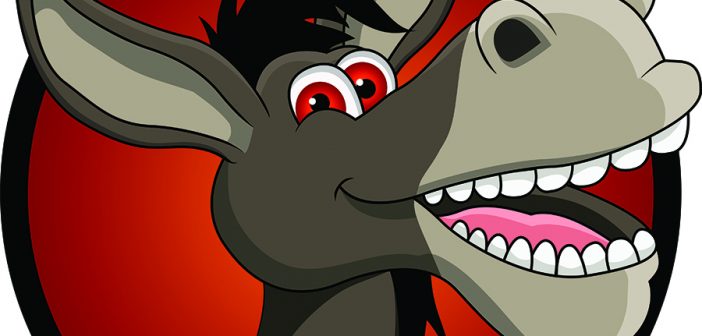Horses, Donkeys and Humility
Changing Your View of the World: It’s Not All About You!

Jack Guarnieri
by Jack Guarnieri, Jersey Jack Pinball & PinballSales.com
Humility. This is sometimes difficult for people who have a bigger view of themselves than others have of them. Did you know that the eyeball of a horse is the largest orb found on any land mammal and therefore has an oversized retina? This large retina magnifies close objects the horse sees, making it 50 percent larger than what the human eye perceives. If the horse knew it was larger than you, it may act differently and with more dominance! The horse believes it is smaller than close objects like humans and therefore it acts accordingly.
What can we learn from this example in nature? We are tiny on a very big planet. We may think we are so big and important or in charge of so many things, but the truth is that none of that is true for the longterm. We are all here, but only for a few moments in time, and there is much that is greater than each of us.
A horse is not typically known as a stubborn animal like its cousin the donkey, though donkeys may have a bad rap. They stay steadfast when faced with a situation they’re not familiar with; its instinct is to stand still and consider its options. Come to think of it, it’s probably a good thing to take time to consider options before moving forward.
Sometimes, you should be the horse and at others, you should be the donkey. In all cases, though, you should be humble. The belief that we are better than others, that we are always right, that we’ve done this before and can do it better should not be confused with a “can-do” attitude.
We should strive to always do better and achieve more, but to me, life is not an “individual” event. You can contribute so much more when you take the blinders off and look around.
Joining a service organization as a volunteer to help others is a great way to learn about the world, other people and cultures, and learn the most about yourself. Go and do something for others without any financial reward. Better yet, do something for others that nobody but you knows about.
For those reading this (and I hope it’s every one of you), you know how great that feels. Doing good for others without them (or anyone else) knowing about it is amazing. It’s the humble way of doing things.
This reminds me of years ago when I was an operator in New York City and always had lots of quarters in my pockets. I’d walk down a street, see expired parking meters and feed quarters into them, extending their time. One time, a meter maid yelled at me while I was doing that as apparently I deprived him of meeting his quota of tickets for the afternoon! I laughed and fed every meter that was expired or near expiration on the block. It was such a small, simple thing, but it probably made a big difference in someone’s life to come out and not find a ticket on their car.
As a leader, it’s not about others serving you, but you serving others. You should be an example of a servant-leader. My space here is limited but “Google it” and read some books on the topic. (While you’re at it, read about the Parable of the Guests, another great lesson in humility.) Adopt it in your personal and business life. It will make you and those around you better. You will give credit to others for things that you’ve done or that they’ve done alongside you. You’ll stop keeping score of what you did and how great you are.
You will learn to build and lift other people up by lowering yourself. If you’re looking for success, there is nothing to be gained by lowering those around you. Empower others to learn and to grow. Rather than framing everything with “I” and “Me,” use “Us” and “We.” Build a real team! The people who did the work know who did it. (If you need a refresher on that read the folk tale The Little Red Hen.)
Take blame for things that others you supervise have done wrong. Accept responsibility and admit when you are wrong. Say you are sorry and say thank you for a job well done. All of these things show strength of character, not weakness.
Tell your loved ones that you love them, bring them flowers when there is no special occasion and be thankful for everything (not just for the big things, but for the little things as well). Do some random acts of kindness. Thank the person who serves you. Don’t look down your nose at anyone. Remember, you are no better than anyone else no matter what you own, where you work, where you live or what you drive.
Since this column took a turn into the farm this month, let’s go down that road a bit more. Do you know that a male donkey is called a Jack? Yes, and we know that the perception of that donkey is an obstinate animal, perhaps even called an “ass” from its scientific name (equus africanus asinus), thus the term “jackass.” But a female donkey is a Jenny. I’m sure there are plenty of stubborn Jennys out there, too.
Jack Guarnieri started servicing electro-mechanical pinball machines in 1975 and has been involved in every phase of the amusement game business since then. He was an operator in NYC, then began a distributorship in 1999, PinballSales.com, selling coin-op to the consumer market. In January of 2011 he founded Jersey Jack Pinball (named after his RePlay Magazine pen name), which builds award-winning, full-featured, coin-op pinball machines. Email Jack at jack@ jerseyjackpinball.com.




